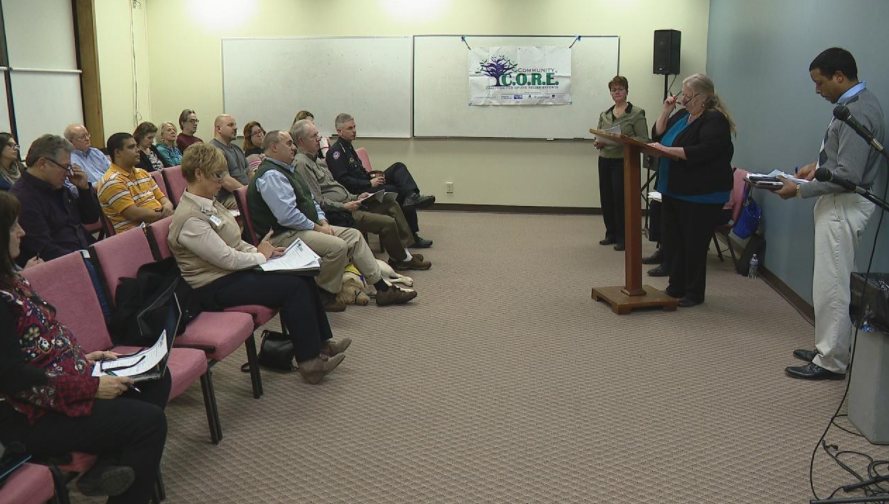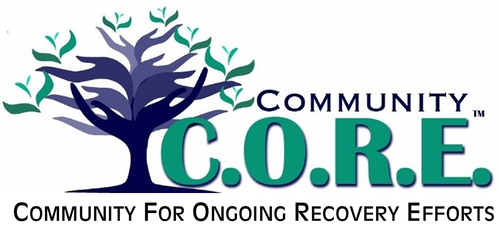"It's our local version of an opioid task force," said Tammy Nicholl.
The group uses a four-prong approach, dividing the groups into teams. One team is prevention, another treatment and recovery. There's the medical team and the legal and advocacy team. Each team reports to the group on their successes and needs. What they're doing seems to be working, the number of overdose deaths is going down. In 2016 the county registered 13 overdose deaths. In 2017 there were 8 in the county. The numbers are small, but the impact is great. "We are trying to offer hope through treatment and prevention. If nothing else to let them know we're going to win this battle and that the future looks better," said Marshall. A breakthrough for this community as they come together to tackle this crisis.  by Ruben Mees, Bellefontaine Examiner Despite a record high 5 overdose deaths to start 2017, the year actually saw a decline in the total number of deaths — a positive sign that proactive measures being developed by the local opiate task force are working. “What we do know is that we are seeing a drop from 2016 to 2017,” Tammy Nicholl, co-chair of the Coalition for Opiate Relief Efforts said at the group’s quarterly meeting Wednesday. Locally, there were 8 overdose deaths in Logan County in 2017, although 4 additional Logan County residents were pronounced dead of drug overdoses outside Logan County, Nicholl said. Of those 12, 5 deaths were in January 2017. 2017 OVERDOSE DEATHS 2017 started out with an exceptionally high number of overdose deaths of Logan County residents, but there was only one death recorded in the past six months. January 5 February 3 March 1 April 1 May 0 June 1 July 0 August 1 September 0 October 0 November 0 December 0 The total is down from 13 deaths in 2016, but that year’s total did not include out-of-county deaths, she told the coalition members. Over the course of the year, local first responders administered 135 doses of the overdose reversal medication naloxone — a piece of data that was not adequately captured prior to 2017. Of the 135 total doses, some were administered as multiple doses on the same run, CORE co-chairman and pharmacist Steve Marshall noted. “Narcan (a trade name for naloxone) only works a short period of time; so a lot of times when dealing with a lot stronger medications, it takes more to keep them breathing,” he explained. Nearly all overdose cases involve the synthetic opioid fentanyl, Sheriff Randy Dodds noted, adding he was pleased to see the spike in deaths to start 2017 did not carry through to later months in the year. “The way it started off, I thought we were in for it, but it tailed off,” the sheriff said. “We did learn we have to be a lot more careful how we handle drugs now. We mask up and wear gloves because the stuff out there now is so dangerous.” In September, CORE will mark its official fourth birthday and the group discussed a possible dinner as it had in both September 2014 and 2016. Bellefontaine Police Chief Brandon Standley said he has been in contact with Sam Quiñones, the author of the acclaimed book Dreamland, to try to get him to speak at the event. Steven White, regional director for Sen. Rob Portman’s office, attended and discussed federal funds available through the Comprehensive Addiction Recovery Act and the state-administered grants through the Cures Act. “We want to make sure Logan County can get access to some of that money for some of its key projects,” White said. “One of the big things we have to do as a community is to figure out what grants we are going to go after and put our best foot forward.” Four areas have already been identified, Logan County Family Court administrator and grant writer Annette Deao said. Among them are a health educator for the community, creating detox beds or an inpatient rehabilitation center, creating new peer support opportunities and increased funding for the Logan County Joint Drug Task Force. Other CORE team members highlighted the following successes from 2017: • An overdose response team was formed between law enforcement, social services and sober support peers to reach out to individuals who overdose and the group has made numerous contacts over the course of the year. • Several new sober events and activities, including a recent New Year’s Eve party, four new weekly sober support meetings and Celebrate Recovery launched last year. • Local physicians have increased their ability to prescribe medication-assisted treatment drugs, including both Suboxone and Vivitrol. • Local doctors, including the Mary Rutan Emergency Department physicians, have continued to move along discussions about prescribing opiates for pain relief, while nearly all pharmacists are continuing to use the Ohio Automated Rx Reporting System to track opioid prescriptions. • Medication take-back programs, including stationary drop boxes at the Logan County Sheriff’s Office and Russells Point Police Department, have netted more than a ton — 2,000 pounds — of unwanted medications since the program’s inception in 2010. • A conversation has begun about the need for local detox beds and providing a better bridge to therapy for individuals who are beginning withdrawal from opiates and other addictive drugs. • Educational efforts continue in the schools to steer youths away from drug and alcohol use. • The Logan County Family Court has become the central drug testing service for Logan County programs and administered 5,812 drug screens in 2017 with 12 percent positive results compared to 17 percent the year prior. A news crew from WSYX-TV in Columbus was also present at the meeting and the station is planning to air a segment on Logan County’s recovery efforts on Thursday, Jan. 18. The next full meeting of the CORE coalition is set for 5 p.m. Thursday, April 11, while CORE team leaders meet at 12:30 p.m. Thursday, Feb. 15. Both meetings are at Union Station, 613 Hamilton St. |
News & Local UpdatesArticles and stories that reflect and highlight the work of the Logan County Joint Drug Task Force and other local organizations. Archives
October 2019
Categories
All
|


 RSS Feed
RSS Feed

